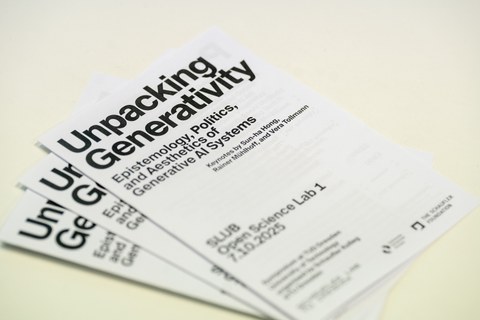Nov 20, 2025
Report on the Symposium ‘Unpacking Generativity’ (October 7th 2025), Schaufler Lab@TU Dresden
On October 7th 2025, the symposium ‘Unpacking Generativity. Epistemology, Politics and Aesthetics of Generative AI Systems’ took place at Dresden, University of Technology. The event was organized by Niklas Egberts (Cultural Studies), Jasmin Höning (Art History), and Nelly Saibel (Political Science), PhD candidates and research fellows at the Schaufler Kolleg@TU Dresden.
The symposium was motivated by the observation that the term ‘generativity’ has been gaining prominence in the context of artificial intelligence. Contemporary AI systems are increasingly described as ‘generative’—that is, as technologies capable of autonomously and algorithmically producing content such as text, images, audio, or video. ‘Generativity’ has become a buzzword and appears frequently in scientific and technological discourses; however, it often remains insufficiently defined for the purposes of humanities and social science inquiry.
The Schaufler Lab@TU Dresden took this indeterminacy as a starting point for a critical engagement with the concept of ‘generativity’ in the context of AI systems. The aim of the symposium was to move beyond a purely technical or commercial perspective in order to situate the agency and societal impact of generative AI systems within the tensions between politics, economy, knowledge systems, and visual culture.
To this end, the event approached the concept of ‘generativity’ through three structuring thematic blocks—epistemology, politics, and aesthetics—in order to develop an interdisciplinary perspective on the many interconnections between generative AI systems and society. The interdisciplinary dialogue revolved around the following guiding questions: What do generative AI systems make visible? What remains invisible, or is actively excluded? What political, cultural, and epistemic implications follow from the generativity of algorithmic media? These guiding questions were explored within the three thematic blocks as well as in a concluding panel discussion. Each thematic block consisted of a keynote, two talks, and a joint discussion.
Following a brief thematic introduction by the organizers, Sun-ha Hong (University of North Carolina) opened the epistemology block—moderated by Niklas Egberts—with the keynote ‘The Epistemic Hall of Mirrors and Generativity’s Miasma.’ In his talk, Hong demonstrated how AI systems transform speculative knowledge into apparent certainties—while increasingly producing their own epistemic mirror worlds. His research linked technological predictions about futures with predictions about future technologies, weaving them into a shared narrative that critically interrogates the role of algorithmic media. Yannick Nepomuk Fritz (University of Basel) then gave a talk on (post-)structuralist projections onto large language models. Konstantin Mitrokhov (Leuphana University) concluded the block with reflections on meaning-making in general-purpose computing.
In the second block, Nelly Saibel moderated contributions that focused on the political dimension of generative AI systems. In his keynote ‘Generative AI and Neo-Fascist Politics,’ Rainer Mühlhoff (University of Osnabrück) situated the logics of generative AI within the current challenges facing liberal democracies. He examined generative AI systems with a particular emphasis on the interplay between authoritarian structures and technological development. At the center of the talk was the observation that generative AI is entangled with societal power relations and ultimately serves the usage patterns of digital fascism. In her talk, Nora Freya Lindemann (University of Osnabrück) addressed the concept of ‘sealed knowledges’ and its political and epistemic implications. Sandeep Mertia (Stevens Institute of Technology) concluded the block by exploring the potential of a postcolonial AI in relation to multilingual LLMs.
The third block, moderated by Jasmin Höning, focused on the aesthetic dimensions of generative AI. In her keynote ‘What AI Generated Video Art Shows Us – Conceptual Shifts of the Image,’ Vera Tollmann (Leuphana University) examined the implications of technological developments for visual culture. Her talk centered on aesthetic manifestations, with particular attention to media-aesthetic concepts, epistemological shifts, and the critical reflection of ‘artificial’ image politics in contemporary artistic video practices. Alexandra Gilliams (Université Paris 1 Panthéon-Sorbonne) addressed the aesthetics of spectacle at the intersection of narratives about AI technology and spirituality. Larissa Lenze (University of Paderborn) concluded the block with an analysis of the re-imagination of nature through generative AI and the role of Big Tech in artistic practice.
Already during the thematic blocks, clear thematic interconnections emerged. Overall, the event demonstrated that an interdisciplinary perspective enables a productive exchange, as the contributions revealed numerous cross-references that made them accessible for debates across different disciplines. These connections resurfaced in the concluding panel discussion with the three keynote speakers, which was moderated by Özgün Eylül İşcen, postdoctoral researcher at the Schaufler Lab@TU Dresden. Topics addressed in the panel included the inherently authoritarian modes of functioning and application of generative AI systems, which not only lead to the erosion of democratic values and epistemological shifts, but also manifest in visual markers and exhibition practices that promote and sustain mystifying narratives. The discussion also critically reflected on the role of institutions such as universities and museums, as well as on the researchers’ own scholarly practices.
The symposium clearly illustrates that the ‘generativity’ of AI systems is more than a technical process: it can be understood as a cultural, aesthetic, epistemic, and political practice that not only challenges our current understanding of artificial intelligence but also requires critical reflection on media technologies, the imperative of creativity, and existing knowledge systems. The event further demonstrated the importance of creating spaces for academic exchange within and across disciplines. The thematic emphases highlight the social relevance and critical potential of the humanities and social sciences for examining the history, functioning, applications, and consequences of technological developments, for questioning their societal precarities, and for seeking broader connections.
Niklas Egberts, Jasmin Höning, Nelly Saibel

